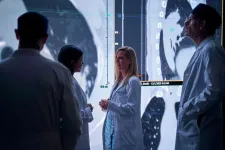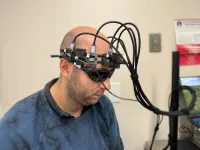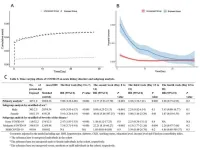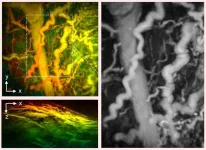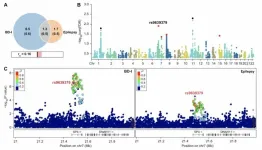(Press-News.org) (WASHINGTON – September 30, 2024) In the largest prospective study to date examining the use of chimeric antigen receptor (CAR)-T therapy in a community setting on an outpatient basis, patients with relapsed or refractory large B-cell lymphoma (LBCL) responded well to treatment with few serious side effects, according to results published today in Blood Advances.
LBCL is a cancer affecting B lymphocytes, a type of white blood cell. It can progress rapidly and is fatal if untreated, although most forms of LBCL respond well to standard cancer medications. For those patients who do not see their cancer eradicated with standard treatments (refractory) or who see their cancer return after an initial response (relapsed), CAR-T therapy can be an effective treatment option. In CAR-T therapy, a patient’s own immune cells are removed, genetically altered, and then infused back into the body to attack and kill lymphoma cells.
Pursuing CAR-T therapy can be challenging for patients and caregivers who may have to take time off from work and find temporary accommodations far from home. CAR-T therapy comes with unique and potentially serious side effects, such as cytokine release syndrome (CRS), characterized by fever, low blood pressure, and/or low oxygen levels, and damage to the brain (neurotoxicity). Patients require close monitoring and are often hospitalized for observation after treatment and advised to stay within one hour of the hospital where they received the treatment.
According to Yuliya Linhares, MD, chief of the lymphoma service at Miami Cancer Institute and study author, one of the biggest hurdles accompanying CAR-T therapy has been patient access. “Transferring patients to a new health system can cause headaches for obtaining insurance approvals, arranging appointments, and ensuring continuity of care,” she said.
In the OUTREACH study, Dr. Linhares and her colleagues evaluated the feasibility of administering CAR-T therapy on an outpatient basis to mitigate barriers to access. The study included 82 patients with relapsed or refractory LBCL who were eligible to receive lisocabtagene maraleucel (liso-cel), one of several CAR-T cell products approved by the U.S. Food and Drug Administration, having received two or more prior lines of treatment. Liso-cel was selected based on its relatively lower risk of serious side effects.
Liso-cel is one of several CAR T-cell products approved by the U.S. Food and Drug Administration and was selected for the study based on its relatively lower risk of serious side effects. The results showed that the efficacy of the treatment was in line with previous liso-cel trials, with 80% of patients experiencing an objective response to treatment, meaning the cancer was significantly reduced or eradicated, and 54% experiencing a complete response, meaning no residual cancer was found.
“I’m very excited to see this therapy offered to a wider range of patients,” said Dr. Linhares. “Traditionally, CAR-T cells have been administered by expert teams at university-based medical centers, which of course limits access to this very-needed therapy. The longer patients have to wait for CAR-T administration, the worse the outcomes. It is important to show that this therapy can be safely given not just in university-based medical centers, but also in community medical centers, and that it can be given not only in an inpatient setting but also in an outpatient setting.”
Nearly three-quarters of the centers involved in the study had not previously treated patients with CAR-T therapy. Of the 70% of study participants who received the treatment on an outpatient basis, one-quarter never required hospitalization. Among patients hospitalized during their treatment, the median duration of hospital stay was six days for those treated on an outpatient basis and 15 days for those who received their CAR T-cells as an inpatient.
About half of the participants experienced low-grade CRS, but no patients experienced CRS events of grade three or higher. Rates of neurotoxicity events and infections were both low and in line with those observed in previous trials, indicating that neither outpatient treatment nor the community hospital setting brought any increased risk.
“I encourage as many sites as possible to work on building CAR-T cell programs,” said Dr. Linhares. She added that the successful implementation of CAR T-cell treatment requires a team effort with a high level of coordination among physicians, nurses, and physician assistants; well-delineated standard operating procedures; appropriate labeling in the electronic medical records system; and staff training across multiple hospital departments to ensure any complications are caught and addressed quickly. Moving forward, she suggested that more research could clarify appropriate criteria for determining which patients are best suited for outpatient versus inpatient treatment.
The study did have some limitations, including that tumor burden may have been higher for patients treated on an inpatient basis and that response assessments were performed solely by an investigator, not with the input of an internal review committee. Additionally, the study was not designed with a primary goal of supporting comparisons between inpatients and outpatients.
The study authors expressed hope that the findings will open the door for a much broader array of medical centers to be able to administer CAR-T therapy, avoiding missed opportunities and potentially saving lives by making it feasible for patients to receive the treatment more quickly and closer to home.
This study was funded by Bristol Myers Squibb.
###
Blood Advances (bloodadvances.org) is an online, open-access journal publishing more peer-reviewed hematology research than any other academic journal worldwide. Blood Advances is part of the Blood journals portfolio (bloodjournals.org) from the American Society of Hematology (ASH) (hematology.org).
Claire Whetzel, 202-629-5085
cwhetzel@hematology.org
END
CAR-T safe and effective on an outpatient basis in community hospitals
Study of liso-cel in patients with relapsed or refractory large B-cell lymphoma points to the benefits of bringing advanced therapies closer to patients, minimizing hospitalizations
2024-09-30
ELSE PRESS RELEASES FROM THIS DATE:
City of Hope to present leading-edge radiotherapy treatments for people with lung, genitourinary and blood cancers at the American Society for Radiation Oncology Annual Meeting
2024-09-30
LOS ANGELES — City of Hope®, one of the largest and most advanced cancer research and treatment organizations in the U.S. and ranked among the nation’s top 5 cancer centers by U.S. News & World Report, is part of today’s press conference program at the American Society for Radiation Oncology (ASTRO) Annual Meeting, where a renowned City of Hope radiation oncologist will present phase 3 clinical trial data showing that people with limited-stage small cell lung cancer may benefit from adding immunotherapy to chemoradiation, but not if both treatments are given at the same time. The results suggest that the timing of when immunotherapy is given plays a key role in its ...
A new and unique fusion reactor comes together with PPPL's contributions
2024-09-30
Like atoms coming together to release their power, fusion researchers worldwide are joining forces to solve the world’s energy crisis. Harnessing the power of fusing plasma as a reliable energy source for the power grid is no easy task, requiring global contributions.
The Princeton Plasma Physics Laboratory (PPPL) — a U.S. national laboratory funded by the Department of Energy (DOE) — is leading several efforts on this front, including collaborating on the design and development of a new fusion device at the University of Seville in Spain. The SMall Aspect Ratio Tokamak (SMART) strongly ...
Reduced risk of serious cardiovascular disease after COVID vaccination
2024-09-30
People who have been fully vaccinated against COVID-19 have a significantly lower risk of developing more severe cardiovascular conditions linked to COVID-19 infection, according to a nationwide study at the University of Gothenburg. At the same time, some cardiovascular effects are seen after individual doses of the vaccine.
The COVID-19 vaccine aims to reduce complications and overall mortality from the disease. At the same time, some cardiovascular effects have been seen after individual doses of the vaccine. A rare acute side effect is inflammation of the cardiac muscle or the pericardium in young men following mRNA vaccination. In terms of other cardiovascular ...
New laser-based headset can measure blood flow, assess risk of stroke
2024-09-30
When physicians want to know more about a patient’s risk of cardiovascular disease, they can order a cardiac stress test. But when it comes to risk of stroke, there is no equivalent scalable and cost-effective test of the brain’s function to help physicians counsel patients on their potential risk. A questionnaire that asks patients about contributing risk factors is currently the best tool for estimating such risk.
Now a team of engineers and scientists from Caltech and the Keck School ...
Researchers close in on understanding possible cause of Alzheimer’s disease
2024-09-30
CLEVELAND—With a four-year, $3.3 million grant from the National Institutes of Health (NIH), researchers from Case Western Reserve University will study whether certain brain proteins may play a role in the development of Alzheimer’s disease.
Alzheimer’s disease is a brain disorder that slowly destroys memory and thinking skills. According to the Alzheimer’s Association, nearly 7 million Americans 65 and older are living with the disease and there are more deaths from Alzheimer’s than breast and prostate cancer combined.
Previous research has ...
New synthesis strategy could speed up PFAS decontamination
2024-09-30
HOUSTON – (Sept. 30, 2024) – Rice University engineers have developed an innovative way to make covalent organic frameworks (COFs), special materials that can be used to trap gases, filter water and speed up chemical reactions. COFs have the potential to address significant environmental challenges, including energy storage and pollution control. An example of that is their potential use in the decontamination of “forever chemicals” or per- and polyfluoroalkyl substances (PFAS).
Rice chemical engineer Rafael Verduzco and his team have described a new way to synthesize high-quality ...
COVID-19 linked to increased risk of acute kidney disorders: New study reveals time-varying effects
2024-09-30
Researchers from West China Hospital, Sichuan University, have conducted a study revealing a significant association between COVID-19 and acute kidney disorders (AKD), including acute kidney injury (AKI), that varies over time. The study, led by Dr. Li Chunyang and Dr. Zeng Xiaoxi from the West China Biomedical Big Data Center, was recently published in the journal Health Data Science.
COVID-19, known for its impact on the respiratory system, also affects other organs, including the kidneys. The study aimed to investigate the time-dependent effects of COVID-19 on acute kidney disorders. Using data from the ...
Medical imaging breakthrough could transform cancer and arthritis diagnosis
2024-09-30
A new hand-held scanner developed by UCL researchers can generate highly detailed 3D photoacoustic images in just seconds, paving the way for their use in a clinical setting for the first time and offering the potential for earlier disease diagnosis.
In the study, published in Nature Biomedical Engineering, the team show their technology can deliver photoacoustic tomography (PAT) imaging scans to doctors in real time, providing them with accurate and intricate images of blood vessels, helping inform patient care.
Photoacoustic ...
Genetic link between bipolar disorder and epilepsy unveiled in groundbreaking study
2024-09-30
Kunming, China - A team of researchers from the Chinese Academy of Sciences has uncovered compelling evidence of a genetic link between bipolar disorder type I (BD-I) and epilepsy, potentially revolutionizing our understanding of these complex neuropsychiatric conditions. The study, published in Genomic Psychiatry on September 30, 2024, reveals shared genetic variants and a causal relationship between the two disorders, opening new avenues for research and treatment.
Led by Dr. Ming Li from the Kunming ...
Social networks help people resolve welfare problems - but only sometimes, new research finds
2024-09-30
Lead researcher Dr Sarah Nason, from Bangor University’s School of History, Law and Social Sciences explained: “Debt, benefits, special educational needs, healthcare issues, these are everyday problems that many of us face, and it’s only natural to turn to people you know and trust for help and advice. However, we found that having to talk to more people or support services was an indicator that the problem was more complex and difficult to resolve.”
The team studied four distinct areas across England and Wales: Bryngwran, a village on Anglesey in North Wales; Deeplish, a district of Rochdale in Greater ...
LAST 30 PRESS RELEASES:
How much sleep do teens get? Six-seven hours.
Patients regain weight rapidly after stopping weight loss drugs – but still keep off a quarter of weight lost
GLP-1 diabetes drugs linked to reduced risk of addiction and substance-related death
Councils face industry legal threats for campaigns warning against wood burning stoves
GLP-1 medications get at the heart of addiction: study
Global trauma study highlights shared learning as interest in whole blood resurges
Almost a third of Gen Z men agree a wife should obey her husband
Trapping light on thermal photodetectors shatters speed records
New review highlights the future of tubular solid oxide fuel cells for clean energy systems
Pig farm ammonia pollution may indirectly accelerate climate warming, new study finds
Modified biochar helps compost retain nitrogen and build richer soil organic matter
First gene regulation clinical trials for epilepsy show promising results
Life-changing drug identified for children with rare epilepsy
Husker researchers collaborate to explore fear of spiders
Mayo Clinic researchers discover hidden brain map that may improve epilepsy care
NYCST announces Round 2 Awards for space technology projects
How the Dobbs decision and abortion restrictions changed where medical students apply to residency programs
Microwave frying can help lower oil content for healthier French fries
In MS, wearable sensors may help identify people at risk of worsening disability
Study: Football associated with nearly one in five brain injuries in youth sports
Machine-learning immune-system analysis study may hold clues to personalized medicine
A promising potential therapeutic strategy for Rett syndrome
How time changes impact public sentiment in the U.S.
Analysis of charred food in pot reveals that prehistoric Europeans had surprisingly complex cuisines
As a whole, LGB+ workers in the NHS do not experience pay gaps compared to their heterosexual colleagues
How cocaine rewires the brain to drive relapse
Mosquito monitoring through sound - implications for AI species recognition
UCLA researchers engineer CAR-T cells to target hard-to-treat solid tumors
New study reveals asynchronous land–ocean responses to ancient ocean anoxia
Ctenophore research points to earlier origins of brain-like structures
[Press-News.org] CAR-T safe and effective on an outpatient basis in community hospitalsStudy of liso-cel in patients with relapsed or refractory large B-cell lymphoma points to the benefits of bringing advanced therapies closer to patients, minimizing hospitalizations
